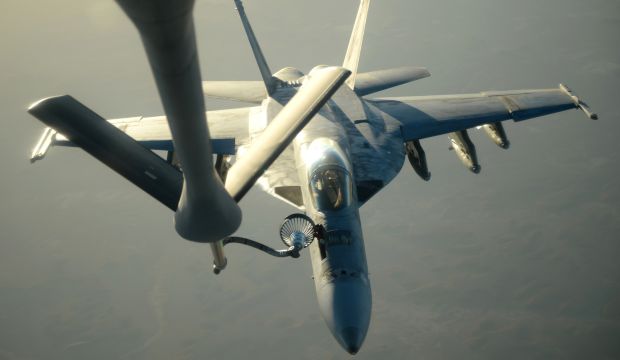
A US Navy F-18E Super Hornet receives fuel from a KC-135 Stratotanker over northern Iraq after conducting airstrikes on ISIS and other targets in Syria. (AP Photo/US Air Force, Staff Sgt. Shawn Nickel)
Beirut, AP—US-led coalition warplanes bombed oil installations and other facilities in territory controlled by Islamic State of Iraq and Syria (ISIS) militants in eastern Syria on Friday, taking aim for a second consecutive day at a key source of financing that has swelled the extremist group’s coffers, activists said.
The strikes hit two oil areas in Deir Ezzour province a day after the United States and its Arab allies pummeled a dozen makeshift oil producing facilities in the same area near Syria’s border with Iraq. The raids aim to cripple one of the militants’ primary sources of cash—black market oil sales that the US says generate up to 2 million US dollars a day.
The Britain-based Syrian Observatory for Human Rights said the strikes overnight and early Friday hit the Tink oil field as well as the Qouriyeh oil-producing area in Deir Ezzour. It said air raids also targeted the headquarters of ISIS in the town of Mayadeen.
The Observatory said the strikes were believed to have been carried out by the coalition. Another activist collective, the Local Coordination Committees, also reported four strikes on Mayadeen that it said were conducted by the US and its allies.
There was no immediate confirmation from the United States or its allies.
The Observatory, which relies on a network of activists inside Syria, said there were reports of casualties in the strikes, but did not have concrete figures.
The group reported another apparent coalition air raid on ISIS positions outside the city of Hasakah in northeastern Syria near the Iraqi border. Those strikes targeted an oil production area, as well as vehicles the militants had brought in from Iraq and tried to bury in the ground to protect them, according to Observatory director Rami Abdulrahman.
The US-led coalition, which began its aerial campaign against ISIS fighters in Syria early Tuesday, aims to roll back and ultimately crush the extremist group that has created a proto-state spanning the Syria-Iraq border. Along the way, the militants have massacred captured Syrian and Iraqi troops, terrorized minorities in both countries and beheaded two American journalists and a British aid worker.
The air assault has taken aim at ISIS checkpoints, training grounds, oil fields, vehicles and bases as well as buildings used as headquarters and offices.
Activists say the militants have cut back the number of gunmen manning checkpoints, apparently fearing more strikes. There has also been an exodus of civilians from ISIS strongholds.
“Everywhere where there are ISIS buildings, the people living around these buildings are leaving. They are moving far from ISIS buildings, either to other villages or to other areas in the same cities,” said Abdulrahman. “This has happened in Raqqa, in Deir Ezzour and in many towns and villages.”
Raqqa, an ancient city located on the Euphrates River in northeastern Syria, is the de facto capital of ISIS’s self-declared caliphate.
The coalition campaign expands upon the airstrikes the US has been conducting on its own against the extremist faction for more than a month in Iraq. France joined the American effort in Iraq a week ago, and is considering whether to extend its airstrikes to Syria as well.
Denmark, meanwhile, announced Friday it would send seven F-16 fighter jets to take part in the airstrikes in Iraq, two days after the Netherlands did so. Britain and Belgium are also debating their involvement in the coalition Friday. The European countries do not plan to deploy in Syria.
The international operation targeting the ISIS adds another layer to Syria’s civil war, a conflict that has already killed more than 190,000 people since the revolt against President Bashar Al-Assad began in March 2011.
While overshadowed by the coalition strikes against the ISIS, fighting between Syrian government troops and rebels has raged on with its usual ferocity.
Assad’s warplanes struck opposition-held towns in several provinces, including Hama in central Syria and Dera’a in the south, activists said. There was no immediate word on casualties.
In Damascus, government soldiers backed by gunmen from the Lebanese Shi’ite militant Hezbollah group battled rebels on the edges of the suburb of Jobar, the Observatory said.
ISIS meanwhile continued to press its offensive near the Turkish border against Syrian Kurds, closing in on the border town of Ain Arab, also known as Kobani. The militants have overrun dozens of villages in the area in recent weeks as they look to clear out one of the few remaining pockets of resistance to their rule in northern Syria.
A senior Kurdish fighter overseeing the defense of Kobani, Ismet Sheikh Hassa, said that ISIS fighters were advancing on the city from three sides Friday and were now launching mortars and rockets into Kobani itself.
He said that Kurdish fighters were outgunned, using old Russian weapons and assault rifles to fend off the attack.
“They have heavy weapons,” including tanks, artillery and machine-guns, Hassa said by telephone. “The Islamic State [ISIS] is firing mortars and rockets over Kobani randomly. There are numerous civilian causalities.”
He said that coalition airstrikes had been mostly directed against targets in other parts of the country and had done little to ease the siege of Kobani.
Also on Friday, scores of Kurdish activists and fighters were seen removing barbed wire and crossing the Turkish border to help defend the city.

Trackbacks/Pingbacks